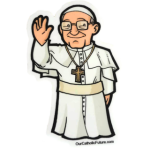Last night, as I was looking at the passage about the year of jubilee in Leviticus, this amazing line in Leviticus 25:23 jumped out at me. It’s the justification God gives His people for redistributing all their property and freeing all their slaves every 50 years: The land is Mine, and you reside in My land as foreigners and strangers. I believe that this sentence is a paradigm for understanding the whole gospel and a potential foundation from which we should consider every social issue we face in our world.
First, in a metaphorical sense, this sentence captures the gospel, because in the kingdom of God, we are illegal aliens granted amnesty by the blood of Christ. We have absolutely no right to inhabit God’s kingdom; we deserve for God to leave us in the outer darkness so that we won’t contaminate the perfect holy, peaceful place to live that God has created. But God wants us to live in His holy peace as aliens who are both naturalized and reminded of our complete dependency on grace by the mark of Jesus’ cross on our hearts. It is only as naturalized aliens that we can avoid contaminating God’s holy peace. We could not inhabit God’s kingdom as un-alien citizens without trying to make His kingdom ours, tailoring our moral/ethical systems to affirm and justify what is already our natural way of being as well as condemn whatever “other” we define ourselves against, and then building apartheid walls to keep the “other” out. (Oh wait a minute, that’s exactly what many of us do already, because we see Jesus’ sacrifice as our entitlement rather than our gift!)
It requires constant meditation on the gift of the cross not to forget our eternal status as naturalized aliens and live in the perpetually humble reverence of the gift that rebukes every sense of entitlement which rises up in our hearts. Once we are grounded in this basic understanding of our eternal condition, there is no reason that Leviticus 25:23 doesn’t also apply to all of our daily life circumstances as well, which is of course the context in which it appears in the jubilee passage. God, what do we do if one of our neighbors has a drinking problem and loses all his money so that he has to sell his family into slavery? Do they get freed in the year of jubilee? The land is Mine, and you reside in My land as foreigners and strangers. What about if I buy my neighbor’s tent and flip it for a 100% profit? Does he get it back when jubilee comes? The land is Mine, and you reside in My land as foreigners and strangers.
Verses 35-37 are remarkable in their prohibition of economic practices that we take for granted as being just part of how the economy works: “If any of your fellow Israelites become poor and are unable to support themselves among you, help them as you would a foreigner and stranger, so they can continue to live among you. Do not take interest or any profit from them, but fear your God, so that they may continue to live among you. You must not lend them money at interest or sell them food at a profit.” Zero-percent interest loans, selling food at cost? Are you kidding me? The land is Mine, and you reside in My land as foreigners and strangers.
Imagine if our attitudes about the issues facing us today were grounded in this basic presumption of who the Earth belongs to. What would be our attitude about the environment knowing that the land is God’s? How would we talk about illegal immigrants knowing that we too are foreigners and strangers in God’s land? What about intellectual property right disputes when scientists discover how to manipulate the natural processes for which God deserves the patent?
So much of how our world is currently constructed draws on a view of reality in which the land does not belong to God. It belongs to whoever has the money to buy it or the family that has always owned it. The absence of God’s name from the title of our property is definitively what makes us a secular world. Obviously, the sinfulness of human nature causes our society to need walls and locked doors in order for us to live safely. And we need a border patrol too. As Robert Frost wrote, “Good fences make good neighbors.” But part of being Christian in a secular world requires perpetually resisting the privatization of our consciousness. How can we live in such a way that we constantly bear witness to the truth that this world belongs to God and we are mere foreigners within it granted passage only by His grace? The degree to which we live by that truth is the degree to which we inhabit God’s kingdom instead of the fallen world He has called us to rise beyond.















